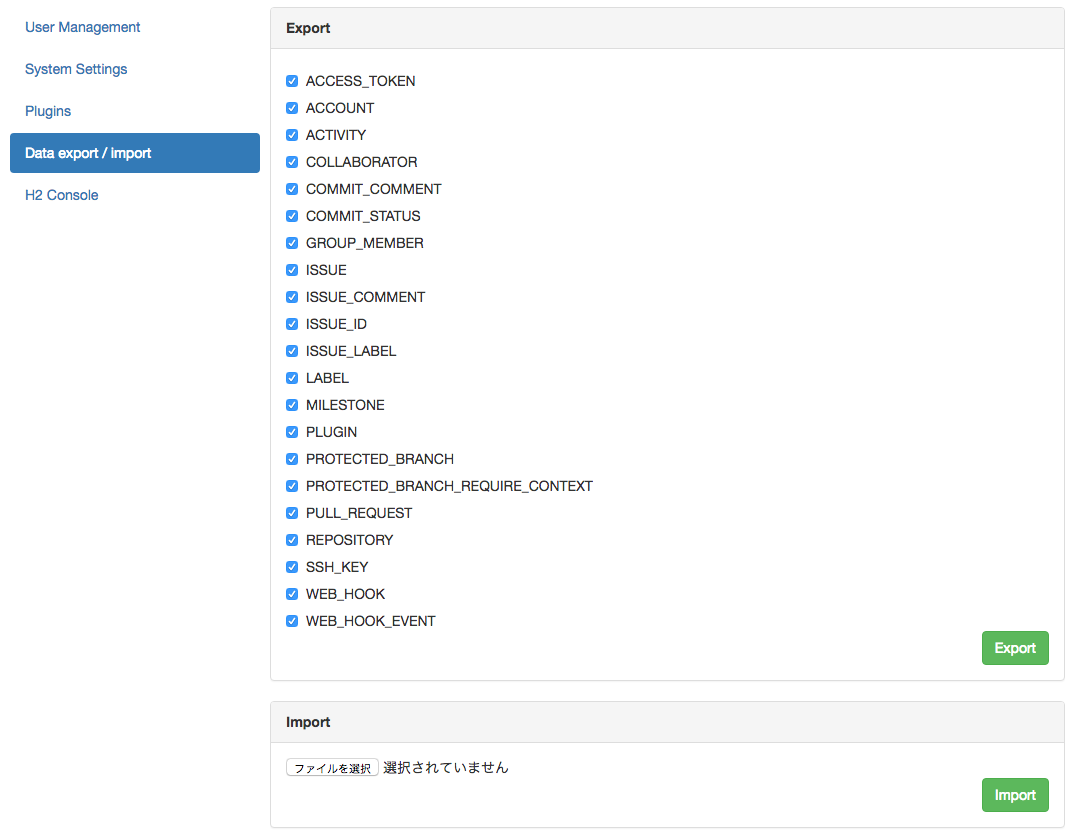External database configuration - gitbucket/gitbucket GitHub Wiki
Since 4.0, GitBucket supports MySQL (>= 5.7) and PostgreSQL, not only embedded H2 database.
Configuration
You can configure database connection in GITBUCKET_HOME/database.conf:
H2 (default)
db {
url = "jdbc:h2:${DatabaseHome};MVCC=true"
user = "sa"
password = "sa"
}
MySQL 5.7 (or higher)
prerequisites:
mysql -uroot -p -hlocalhost
create database gitbucket;
grant all privileges on `gitbucket`.* to testuser@localhost identified by 'testpassword';
flush privileges;
quit
GITBUCKET_HOME/database.conf :
db {
url = "jdbc:mysql://localhost/gitbucket?useUnicode=true&characterEncoding=utf8"
user = "testuser"
password = "testpassword"
}
It's not supported officially, but it might work with MariaDB 10.2.1 (or higher, up to version 10.4.3, see issue #2361 occurring on MariaDB 10.4.4 or higher) as well.
Note: If see a following exception like java.sql.SQLInvalidAuthorizationSpecException: Access denied for user 'testuser'@'localhost' (using password: NO) with MySQL8, or java.sql.SQLException: Could not connect to address=(host=metabase-db)(port=3306)(type=master) : RSA public key is not available client side (option serverRsaPublicKeyFile not set), probably it's caused by the change in the default authentication plugin in MySQL8. Since GitBucket doesn't support it so far, you need to change authentication method in MySQL side as follows:
ALTER USER 'testuser'@'localhost' IDENTIFIED WITH mysql_native_password BY 'testpassword';
PostgreSQL 9.5 (or higher)
Prerequisites: Create database and user with login rights, for example using the postgres commandline tool. Login in into postgres commandline tool.
sudo su - postgres
psql
CREATE DATABASE gitbucket;
CREATE USER gitbucket_user WITH ENCRYPTED PASSWORD 'YOUR_PASSWORD!';
GRANT ALL PRIVILEGES ON DATABASE gitbucket TO gitbucket_user;
GRANT CONNECT ON database gitbucket to gitbucket_user;
GRANT ALL ON SCHEMA public TO gitbucket_user; -- Required for postgresql >= 15
db {
url = "jdbc:postgresql://localhost/gitbucket"
user = "gitbucket_user"
password = "YOUR_PASSWORD!"
}
Data migration
GitBucket has provided data exporting and importing since 4.0.

If you have existing data in embedded H2 database, you can move your data to external database from H2 database by following operation:
- First of all, you must upgrade to GitBucket 3.14 (This is the final version of 3.x) and then, upgrade to GitBucket 4.x.
- Export data as a SQL file from H2 database at the administration console
- Exclude tables which is created by plug-ins if these plug-ins does not provide for GitBucket 4.x series. Recommend separate export for plug-in's tables. When 4.x supported version will be released, you can restore their data from the exported files.
- Setup the external database and update
GITBUCKET_HOME/database.confas mentioned above and reboot GitBucket - Import an exported SQL file into the configured external database at the administration console
If you fail to import a SQL file, try to import it into your database directory.
For example, you can import an exported SQL file using mysql command in MySQL as:
$ mysql -u root -p gitbucket < gitbucket-export-xxxxxxxx.sql
For postgres use:
sudo su - postgres
psql gitbucket < gitbucket-export-xxxx.sql
MySQL
In the case MySQL, it might be caused following error if it contains names with different only uppercase and lowercase letters.
ERROR 1062 (23000) at line 45: Duplicate entry 'mentaiko' for key 'PRIMARY'
You can avoid this error by using utf8mb4_ja_0900_as_cs which is introduced in MySQL 8.0.1 as a collation.
PostgreSQL
In the case of PostgreSQL, you have to run following to the setup sequence values:
SELECT setval('label_label_id_seq', (select max(label_id) + 1 from label));
SELECT setval('access_token_access_token_id_seq', (select max(access_token_id) + 1 from access_token));
SELECT setval('commit_comment_comment_id_seq', (select max(comment_id) + 1 from commit_comment));
SELECT setval('commit_status_commit_status_id_seq', (select max(commit_status_id) + 1 from commit_status));
SELECT setval('milestone_milestone_id_seq', (select max(milestone_id) + 1 from milestone));
SELECT setval('issue_comment_comment_id_seq', (select max(comment_id) + 1 from issue_comment));
SELECT setval('ssh_key_ssh_key_id_seq', (select max(ssh_key_id) + 1 from ssh_key));
SELECT setval('priority_priority_id_seq', (select max(priority_id) + 1 from priority));
SELECT setval('release_asset_release_asset_id_seq', (select max(release_asset_id) + 1 from release_asset));
-- GitBucket 4.33.0 or before
SELECT setval('activity_activity_id_seq', (select max(activity_id) + 1 from activity));
This operation has a risk to break your data by unexpected reason, so we strongly recommend to backup all your data in GITBUCKET_HOME before upgrading GitBucket.
Migration of plugin data
For some plugins which use the database such as gitbucket-gist-plugin, you have to migrate plugin data also.
- Uninstall these plugins temporarily before upgrading to GitBucket 4.x.
- After upgrading to GitBucket 4.x, export GitBucket tables with plugin tables. (e.g. gitbucket-gist-plugin uses
GISTandGIST_COMMENTtable)- If you would like to upgrade plugins individually, you can export GitBucket data without plugin tables and export only plugin tables to other files. You can import plugin tables after upgrading your plugins.
- Configure GitBucket to use external database, and install GitBucket 4.x supported version of plugins.
- Run GitBucket, and import the data which is exported in 2.
Database Encryption
Some databases support the encryption of the DB specific files on disk. In order to activate such a functionality, the url specified in the GITBUCKET_HOME/database.conf file needs to adjusted according to the database encryption specification.
For H2 (default DB), the encryption steps are described here: http://www.h2database.com/html/features.html#file_encryption .
Note: If encryption is active, the DB Console and other plug-ins that use their own connection also need those encryption adjustments (as they don't rely on the standard GITBUCKET_HOME/database.conf to get their connection from).